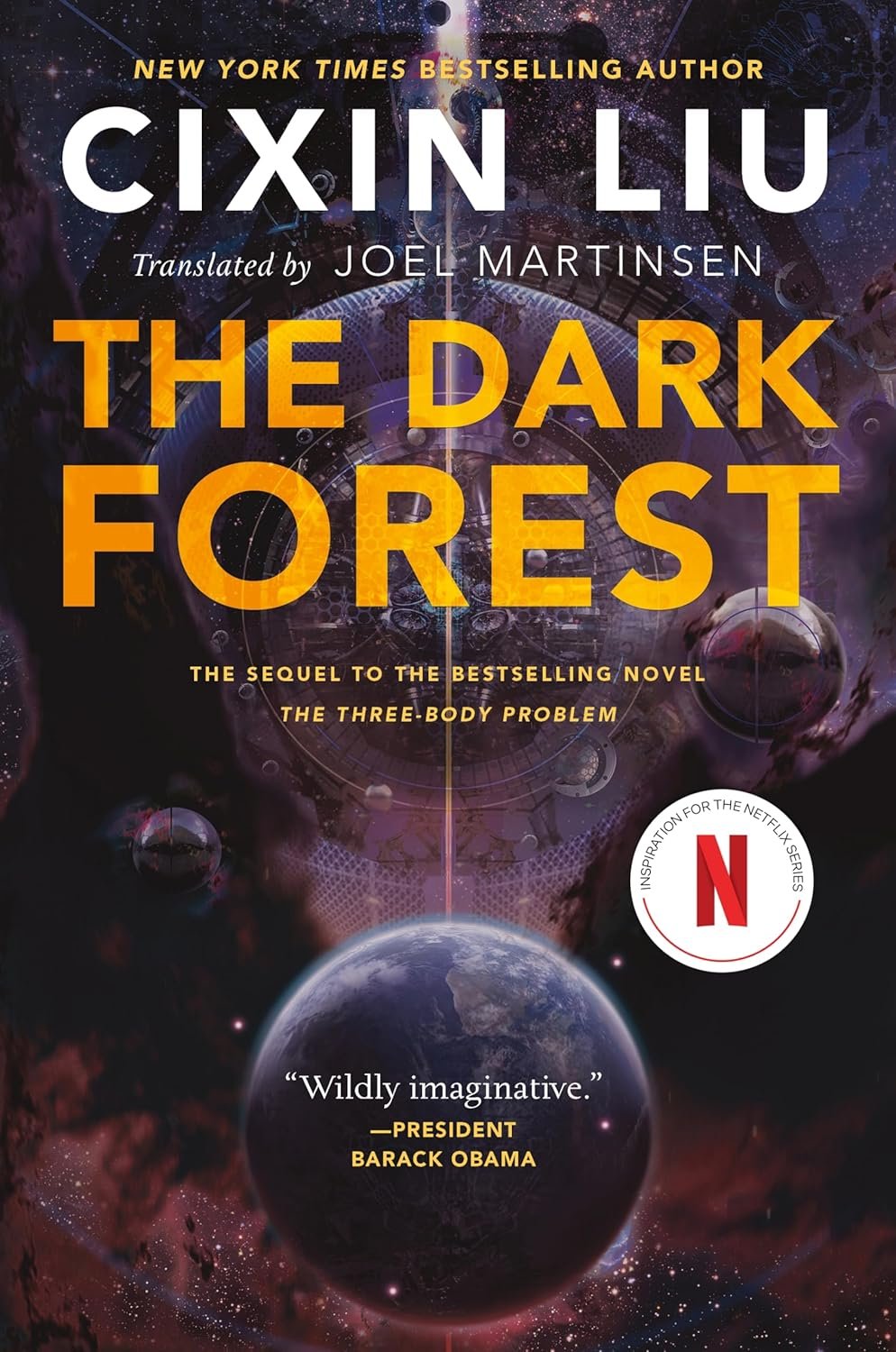The Dark Forest by Cixin Liu
Blurb:
The Dark Forest is the second novel in the groundbreaking, Hugo Award-winning series from China's most beloved science fiction author, Cixin Liu.
In The Dark Forest, Earth is reeling from the revelation of a coming alien invasion-in just four centuries' time. The aliens' human collaborators may have been defeated, but the presence of the sophons, the subatomic particles that allow Trisolaris instant access to all human information, means that Earth's defense plans are totally exposed to the enemy. Only the human mind remains a secret. This is the motivation for the Wallfacer Project, a daring plan that grants four men enormous resources to design secret strategies, hidden through deceit and misdirection from Earth and Trisolaris alike. Three of the Wallfacers are influential statesmen and scientists, but the fourth is a total unknown. Luo Ji, an unambitious Chinese astronomer and sociologist, is baffled by his new status. All he knows is that he's the one Wallfacer that Trisolaris wants dead.
The Three-Body Problem Series
The Three-Body Problem
The Dark Forest
Death's End
Review:
The second instalment of this thought-provoking trilogy builds on the monumental premise established in its predecessor, immersing the reader in a world where the stakes have risen dramatically. The threat from the Trisolarans shifts from theoretical to immediate and suffocating, thanks to the deployment of sophons subatomic surveillance particles that monitor Earth’s every move and halt humanity’s scientific progress. With traditional defences rendered obsolete, a radical plan is enacted: the Wallfacer Project. This initiative grants four individuals unlimited authority and resources to devise secret strategies which are concealed not only from the public but, more crucially, from the ever-watchful Trisolarans. It’s a bold and provocative concept that heightens the tension and complexity of the narrative, pushing the limits of secrecy, deception, and imagination in the face of existential despair.
At the heart of this initiative is Luo Ji, a seemingly unremarkable and disinterested astronomer who appears detached from humanity’s fate. His initial response to his appointment as a Wallfacer is avoidance; he uses the privileges of the role for personal indulgence rather than engaging with the immense responsibility placed upon him. At first glance, he seems an unlikely candidate to hold the key to humanity’s survival. Yet as the story unfolds, Luo Ji’s arc emerges as one of the most compelling in the novel. As he begins to build a life finding love and starting a family as his detachment gradually gives way to resolve. With more to lose, his perspective shifts, and he becomes increasingly determined to uncover a solution to halt the Trisolaran advance. His evolution from passive outsider to strategic linchpin embodies one of the novel’s most poignant themes: the potential for personal growth in the face of crisis.
Dai Shi, a returning character from the first book, provides a grounded and relatable counterbalance to the novel’s abstract and theoretical elements. His military pragmatism, survival instinct, and unwavering loyalty offer a practical lens through which the reader can interpret the overwhelming complexity of unfolding events. What makes Dai Shi especially valuable is his ability to cut through scientific jargon and philosophical speculation. Rather than simplifying the story by diluting it, he brings clarity through intuition and action. His presence lends the narrative a sense of familiarity and emotional ballast, anchoring it when it risks becoming too cerebral.
That said, the novel isn’t without its shortcomings. One of the most noticeable issues is its pacing. The early chapters are rich with exposition, character development, and philosophical inquiry. Cixin Liu spends considerable time establishing the tension and exploring the ideological approaches of the four Wallfacers. However, the latter half especially the lead-up to the climax feels noticeably rushed. Key events unfold rapidly, and some resolutions lack emotional resonance due to the limited space given for them to settle. After lingering so long in the build-up, the story seems to sprint toward its conclusion.
The novel also employs several major time jumps to depict humanity’s long-term evolution under the looming threat of alien invasion. While this technique expands the scope and ambition of the narrative, it comes at the cost of immersion. There’s little insight into how society, culture, or individual lives transform across these vast intervals. The focus remains fixed on strategic developments and high-level decisions, with minimal attention given to the broader human experience. Even brief glimpses into how ordinary people adapt, persevere, or suffer would have added emotional depth and a more holistic sense of the world Cixin Liu has constructed.
Despite these relatively minor flaws, the novel excels in its exploration of how individuals and societies respond under pressure. It probes the psychology of leadership, the isolation that accompanies knowledge, and the moral ambiguity inherent in strategy. The decisions faced by key figures are rarely straightforward and often difficult, sometimes ethically murky. A constant tension simmers between self-preservation and the collective good, and the book doesn’t shy away from examining that burden.
This is a story that challenges assumptions, rewards patience, and lingers long after the final page. While it may occasionally stumble in structure or pacing, its ambition and emotional depth more than compensate. It’s a cerebral, character-driven continuation of a saga that dares to ask what we’re truly capable of when backed into a corner and whether imagination, determination, and flawed humanity might ultimately be our greatest assets in the face of the unknown. Highly recommended for readers who enjoy thought-provoking science fiction that blends big ideas with deeply human storytelling.
